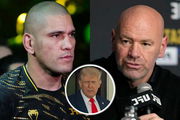

The Nevada Athletic Commission (NAC) has enforced new weigh-in rules, which will shake things up for the fighters. With the excitement for the upcoming UFC Fight Night: Tybura vs. Spivac 2 building ahead of the August 10 event, fighters on the card have weighed in for the bout, but with new rules.
Watch What’s Trending Now!
Earlier, fighters were required to weigh in one day before their fight between 9:00 a.m. and 11 a.m. But, according to the new rules, while the fighters would still be required to weigh in one day before, they must weigh in between 9:00 a.m. and 10:00 a.m., i.e. within the first hour. This is different from the previous arrangement which allowed them to hit the scales anytime in the two hours between 9 and 11 in the morning.
The second hour will now exclusively be reserved for fighters who miss weight the first time, as they will then be allowed another hour to try and shed the extra mass and try again.
ADVERTISEMENT
Chepe Mariscal (149.5) ❌
*3.5-pounds over featherweight limit* #UFCVegas95 pic.twitter.com/s4xdrVEeMb
— MMA Orbit (@mma_orbit) August 9, 2024
while this is already the case in some of the other jurisdictions, this is the first time the NAC has decided to go with this system. And although the two things may not have any causal link, it is worth mentioning that three fighters have missed weight for the UFC Las Vegas card, undoubtedly to Dana White‘s chagrin.
Chepe Mariscal, who will face Damon Jackson in the co-main event of the bout, weighed in at 149.5 lbs- 3.5 pounds over the 146-pound featherweight non-title bout limit. Danny Barlow, on the other hand, missed weight by a feather, weighing in 0.25 pounds over the welterweight limit for his bout.
ADVERTISEMENT
The worst offender, however, was Chelsea Chandler, who was scheduled to face Yana Santos on the main card and came in at 141.5 pounds, 5 pounds over the allowed 136 pounds. But why is it that the fighters miss weight at all?
ADVERTISEMENT
Why weight cutting is so difficult?
Most fighters cut significant amounts of weight to be able to fight in a lower weight class. This, of course, lets them fight smaller opponents than they would face if they fought at their walk-around weight. But with a clear competitive advantage, it also has some drawbacks.
First of all, many fighters have claimed that cutting weight feels almost like dying. This should not be surprising since the process involves fighters severely dehydrating themselves to shed their water weight. Apart from it being unhealthy over the long term, it can also affect the vital body organs and cognitive abilities temporarily. Not to mention a fighter who is severely dehydrated is much more vulnerable to being knocked out.
Top Stories
Alex Pereira’s White House Announcement Has Fans Turning On Dana White as Donald Trump’s UFC Plans Hit a Snag

Jake Paul Did Not Earn $92 Million Fighting Anthony Joshua, Claims UFC Legend

Nina Drama Clowns Andrew Tate as Disrespected Ex-UFC Star Abruptly Leaves Mid-Fight

Ilia Topuria Divorce Dispute Deepens as New Details Surface in Ongoing Extortion Row

Ex-UFC Heavyweight Champ Engages in Backstage Brawl With Jack Doherty at Paul vs Joshua Event

Some, such as Joe Rogan even think the practice is essentially ‘legalized cheating’ and should be done away with for competitive and health reasons. For now, however, weight cutting is an established and seemingly inalienable part of the sport. What are your thoughts on weight cutting in martial arts?
ADVERTISEMENT
ADVERTISEMENT
ADVERTISEMENT
ADVERTISEMENT

